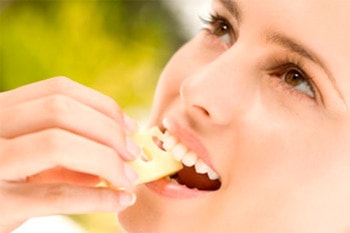How to take good care of teeth and mouth?
To have a bright smile with white teeth and fresh breath, dentists recommend that you regularly do the following things.

Illustration photo
Floss before brushing
Flossing first will help remove food particles stuck between your teeth, making your brushing more effective. If flossing is too awkward for you, look for flossing clips, which are available at drugstores. While brushing, make sure you angle the toothbrush at a 45-degree angle to the gum line, and then brush slowly, moving the brush back and forth.
Change toothbrush
Toothbrushes become frayed, worn, and flattened over time. To improve your oral care and keep your smile bright, replace your toothbrush every three to four months. For electric toothbrush heads, follow the manufacturer's instructions for how long to use them. When you're sick, replace your toothbrush at the beginning of your illness and after you've recovered.
Eating cheese helps whiten teeth
The casein and liquid protein in cheese can help keep tooth enamel in tip-top shape by slowing down the demineralization process. Cheese also contains calcium, which is essential for strong teeth. Don’t forget to add vitamin D to your daily diet to help your body absorb calcium more effectively. Some foods rich in vitamin D include milk, egg yolks, and fish.
Remove tooth stains with baking soda
If you are a coffee, red wine or other food and drink drinker, use a baking soda toothbrush to brush your teeth (twice a month) and then rinse thoroughly to help whiten your teeth. If using raw baking soda irritates your teeth and gums, switch to a baking soda toothpaste or avoid it altogether.
Foods that stain or whiten teeth
There is some evidence that strawberries contain substances that have natural teeth-whitening properties. However, it is best to brush carefully after eating tooth-staining foods such as blueberries, coffee, and tobacco. To help reduce tooth discoloration, chew on an apple, pear, carrot, or celery after brushing. All of these foods will stimulate saliva production, which will help clean your teeth and keep them shiny.
Acid reflux treatment
If you suffer from acid reflux, you need to control it to help maintain the health of your enamel and your oral health. You should avoid foods and drinks that increase acid reflux, including chocolate, alcohol; caffeinated drinks such as soda, coffee, and tea; garlic and onions; dairy products; citrus juices; mint; spices; fatty or fried foods.
Tongue care
To overcome bad breath, in addition to brushing your teeth, you should spend some time brushing or scraping your tongue. You should know that the tongue is a place where a large amount of bacteria gathers and can cause bad breath. Therefore, you should use a toothbrush to brush your tongue or use a specialized tool to scrape your tongue every day. This helps eliminate compounds that cause bad breath in the mouth.
Medications that cause dry mouth
Your mouth needs saliva to maintain healthy teeth and gums, but hundreds of medications, including antidepressants, blood pressure medications, and antihistamines, can dry out saliva. To keep your mouth moist while taking medication, increase your fluid intake. Ask your dentist about artificial saliva products, or chew sugar-free gum to stimulate saliva production after meals.
According to Women Online - NT






